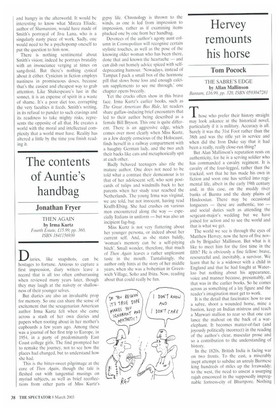The contents of Auntie's handbag
Jonathan Fryer
THEN AGAIN by Irma Kurtz Fourth Estate, £15.99, pp. 360, ISBN 1841156930 Diaries, like snapshots, can be hostages to fortune. Anxious to capture a first impression, diary writers leave a record that is all too often embarrassing when reviewed many years later, though they may laugh at the naivety or shallowness of their younger selves.
But diaries are also an invaluable prop for memory. So one can share the sense of excitement that the sexagenarian American author Irma Kurtz felt when she came across a stash of her own diaries and papers when rooting about in her mother's cupboards a few years ago. Among these was a journal of her first trip to Europe, in 1954, in a party of predominantly East Coast college girls. The find prompted her to remake the journey, not to see how the places had changed, but to understand how she had.
This is the bitter-sweet pilgrimage at the core of Then Again, though the tale is fleshed out with tangential musings on myriad subjects, as well as brief recollections from other parts of Miss Kurtz's gypsy life. Chronology is thrown to the winds, as one is led from impression to impression, rather as if examining items plucked one by one from her handbag.
Devotees of the author's agony aunt column in Cosmopolitan will recognise certain stylistic touches, as well as the pose of the knowing older woman who has been there, done that and known the heartache — and can dish out homely advice spiced with selfdeprecating humour. 'Nowadays. instead of Tampax I pack a small box of the hormone pill that slows bone loss and enough calcium supplements to see me through,' one chapter opens breezily.
Yet the cracks often show in this brave face. Irma Kurtz's earlier books, such as The Great American Bus Ride, let readers share guffaw-inducing brief encounters that led to their author being described as a female Bill Bryson. This one is quite different. There is an aggressive edge, which comes over most clearly when Miss Kurtz, as a Jew deeply conscious of the Holocaust, finds herself in a railway compartment with a haughty German lady, and the two arch their backs like cats and metaphorically spit at each other.
Badly behaved teenagers also rile the mature author. One does not need to be told what a contrast their demeanour is to that of her adolescent self, who sent postcards of tulips and windmills back to her parents when her study tour reached the Netherlands. The young Irma was virginal, we are told, but not innocent, having read Krafft-Ebing. She had crushes on various men encountered along the way — especially Italians in uniform — but was also an incipient fag-hag.
Miss Kurtz is not very flattering about her younger persona, or indeed about her current self. And, as she states baldly, woman's memory can be a self-pitying bitch'. Small wonder, therefore, that much of Then Again leaves a rather unpleasant taste in the mouth. Tantalisingly, the author only hints at the story of her middle years, when she was a bohemian in Greenwich Village, Soho and Ibiza. Now, reading about that could really be fun.


































































 Previous page
Previous page